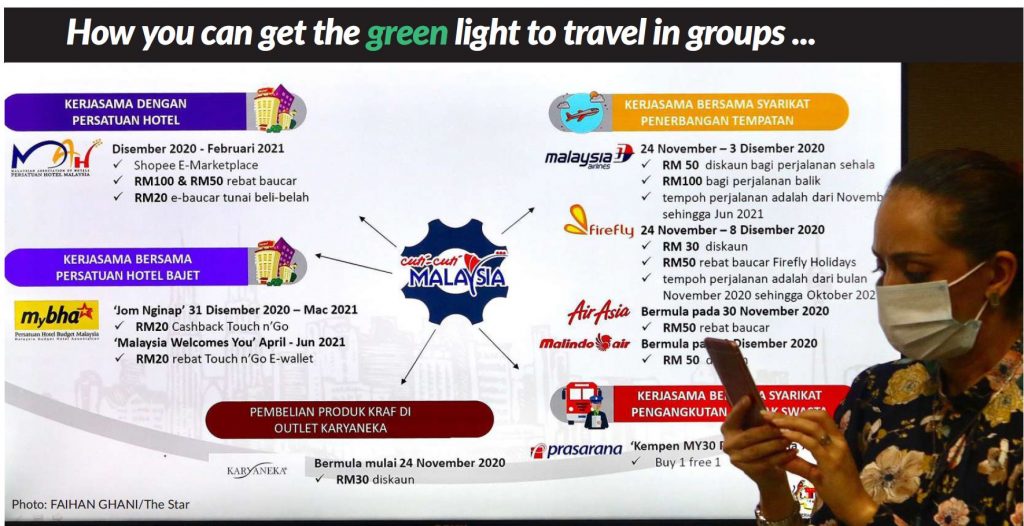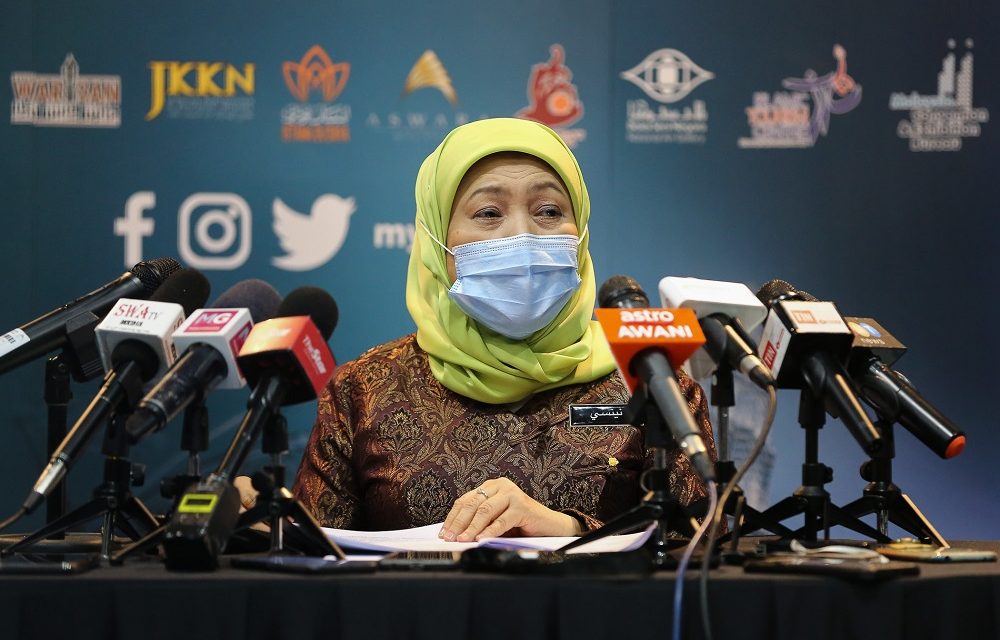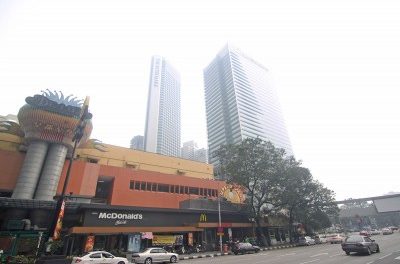Green Zone Domestic Travel Bubble launched
Domestic tourists travelling in a group under registered travel agencies from green zone to green zone need not apply for an individual police permit when they pass through a yellow or red zone to get to their destination. This is among the rules being relaxed to spur the travel sector that has been badly bruised by restrictions to contain Covid-19. “Those travelling in groups under a registered agency need not apply for individual police permit, unlike families or individuals who are travelling on their own, ” said Tourism, Arts and Culture Minister Datuk Seri Nancy Shukri. Travel agencies only need to apply for a group police permit. The Green Zone Domestic Travel Bubble initiative which began on Nov 22 is part of the government’s efforts to ensure the country’s tourism sector recovers and remains active. She said the initiative was in line with the three main strategies under the Tourism Rehabilitation Plan, namely to restore the people’s confidence in travel, focus on reviving domestic tourism, as well as to identify all products and come up with more creative offers by maximising the available resources. Domestic tourism activities allowed under the travel bubble include meetings, conferences, exhibitions, travel fairs, travel marts, cultural carnivals, sports tourism, special interest tourism and courses related to tourism. However, Nancy made it clear that there must be “no stopping anywhere along the journey in red or yellow zones; not at R&R, not at petrol stations”. (The Star Online)

Govt studying need to extend CMCO until end of year
The Government will study the need to extend the Conditional Movement Control Order (CMCO) until the end of the year if COVID-19 cases continue to increase. Minister in the Prime Minister’s Department (Special Functions) Datuk Seri Mohd Redzuan Yusof said at the same time, preventive measures should be taken to reduce the number of cases to a minimum level or attain zero cases. “It is for the survival of the people…by allowing social and economic activities (to resume) and at the same time we can fight the COVID-19 virus,” he said. As such, Mohd Redzuan said there should be no issue of giving some flexibility to traders in Sabah as all economic sectors are allowed to operate during the CMCO period. “The government has also decided that all members of the administration, including the prime minister, senior ministers, ministers and deputy ministers, will contribute not 10% but two months of their salaries to the COVID-19 Fund to help those affected by the pandemic,” he said. (Bernama)
Finance Ministry to set up committee to study reinstatement of GST
The Ministry of Finance (MoF) has set up a committee to study various revenue enhancing measures, including the possibility of reintroducing the Goods and Services Tax (GST), according to Maybank Investment Bank (Maybank IB) Research. It quoted Finance Minister Datuk Seri Tengku Zafrul as saying that other measures included analysing weaknesses in the tax regime and impact of new taxation on the economy, studying options for new taxes such as carbon tax and digital tax, rationalising tax incentives, improving tax administration and enhance tax audit, such as implementing tax identification numbers and enhancing data analytics. “Timing is also important — especially on any new taxes — so as not to disrupt the economic recovery process… 2021 is a transition year from crisis to recovery,” it quoted Tengku Zafrul as saying. Over the medium term, Tengku Zafrul said the government is committed to lowering the budget deficit to 4% of GDP by 2023. On the glove sector, Tengku Zafrul said that the glove manufacturers’ corporate income tax is projected at RM2.8 billion in 2020 and RM4.7 billion in 2021. (Malay Mail)
Malaysia’s job market likely to see further improvement from Q4 onwards
The Institute of Labour Market Information and Analysis (Ilmia) is optimistic that the job market will be better in the fourth quarter of this year (Q4 2020) in Malaysia based on the improvement in job creation and the stable unemployment rate in Malaysia since Q3 2020. Ilmia senior director Betty Hasan said as the government had introduced different types of movement control order (MCO), there was no necessity for a nationwide lockdown and allow only essential services to operate like in the first MCO in March. “Thus we feel that the outlook for Q4 will be better as the economy is recovering and we believe it is positive for Malaysia,” she said. Historically, Betty said the employment rate has remained stable with an average of three per cent for the past few years until 2019, indicating that Malaysia has a tight labour market and a continued demand for labour force. “As the economy started showing signs of recovery, job vacancies increased rapidly in Q3, 2020, with 124,225 job vacancies registered, portraying a decline in the unemployment rate in the same period,” said Betty. (Malay Mail)
People more digitally connected, vulnerable to cyber threats following COVID-19 pandemic
The COVID-19 pandemic has made people more digitally connected and dependent as well as more vulnerable, as they are exposed to cyberattack risks, said Deputy Communications and Multimedia Minister Datuk Zahidi Zainul Abidin. He said digital services such as data centres, cloud systems and servers that employees use for communication are becoming more vital but are faced by threats in cyberspace, as perpetrators are encouraged to exploit them. He said statistics on cybersecurity incidents reported by CyberSecurity Malaysia from January to October this year, recorded 9,042 incidents, with 6,459 or 71% involving fraud. Other incidents include malicious code, intrusion attempts, spams, denial of service, vulnerabilities report, cyber harassment, and content related threats. (Bernama)




